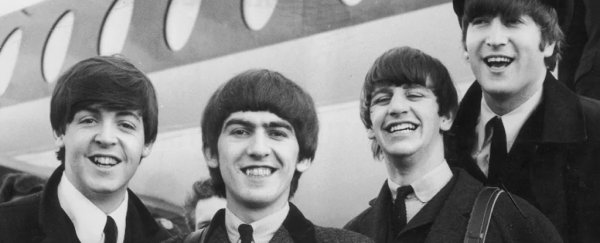"The probability that 'In My Life' was written by McCartney is .018."
"Which basically means it's pretty convincingly a Lennon song."
And with that, Harvard researcher and passionate Beatles fan Mark Glickman made his telling contribution to one of the eternal pop music pub arguments – who wrote the Beatles' best tracks?
The difference this time around is Glickman has science on his side.
Together with fellow Beatles fan Jason Brown – a professor of mathematics at Dalhousie University – Glickman, a senior lecturer in statistics, has handed the question of whether John Lennon or Paul McCartney wrote some of the Fab Four's most memorable tunes over to cold data.
The process, for non-technical music lovers, is a lot more mundane than anything the Beatles – even Ringo – worked on.
You can read more about it here, but the quick version is the pair hooked in former Harvard statistics student Ryan Song and came up with a five-stage method of decomposing each Beatles song from 1962 to 1966.
The idea, Glickman says, was to convert the songs into sets of different data structures.
"Think of decomposing a colour into its constituent components of red, green and blue with different weights attached," Glickman says.
"We're doing the same thing with Beatles songs, though with more than three components.
"In total, our method divides songs into a total of 149 constituent components."
The data sets included frequencies of commonly played chords, notes sung by the lead singer, what chords followed each other, consecutive melodic note pairs and whether melodic sequences were "ups and downs" or "stays the same".
"Consider the Lennon song, 'Help!'," says Glickman. "It basically goes, 'When I was younger, so much younger than today,' where the pitch doesn't change very much. It stays at the same note repeatedly, and only changes in short steps.
"Whereas with Paul McCartney, you take a song like 'Michelle,' and it goes, 'Michelle, ma belle. Sont les mots qui vont très bien ensemble.'
"In terms of pitch, it's all over the place."
From all that, the team had enough information to apply another three-step process to build a model for the probability of whether Lennon or McCartney wrote a song.
And the first victim? "In My Life", from the the 1965 album Rubber Soul – a song ranked 23 on Rolling Stone's The 500 Greatest Songs of All Time.
While it's listed as a classic "Lennon-McCartney" track, which infers Lennon did most of the work, McCartney has disputed that in the past.
But the Glickman model suggests McCartney "misremembers".
"We don't claim that we think Paul was mistaken – rather, our model merely suggests that the patterns of musical idioms in In My Life matches more with Lennon's writing style, relative to the patterns we recorded," Glickman says.
McCartney may, however, be able to claim "The Word", which Glickman thought was certain to be a Lennon song.
Glickman will reveal more details about the study at a talk at the 2018 Joint Statistical Meetings on August 1 in Vancouver.
And at some stage after the team has finalised its models, Glickman says it may release a fuller list of songs it decomposed and what author the model attributed them to.
Glickman says there's more to it than solving bitter pop debates.
"This technology can be extended," Glickman says. "We can look at pop history and chart the flow of stylistic influence."
"We are also considering using lyric content to fine-tune the probability predictions. Ultimately, we'd like to automate the data collection process (which for this project was all hand-coded by my co-author Jason) so we can characterize musical composition styles of different musical artists."
And after "a few years" of fine-tuning the model, Glickman says he's still Team McCartney.
"Generally, I tend to gravitate more to McCartney songs, which in my view tend to be richer in musical detail," he says.
"On the other hand, the music that Lennon wrote over the 1966-67 period in particular is probably some of the best pop music of all time (A Day in the Life, Strawberry Fields, I am the Walrus, etc.)."
This article was originally published by Business Insider.
More from Business Insider:
